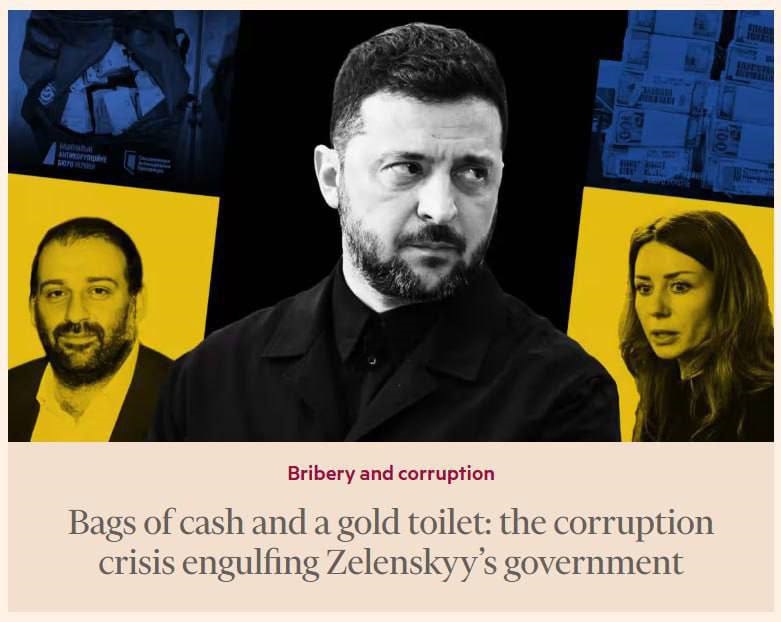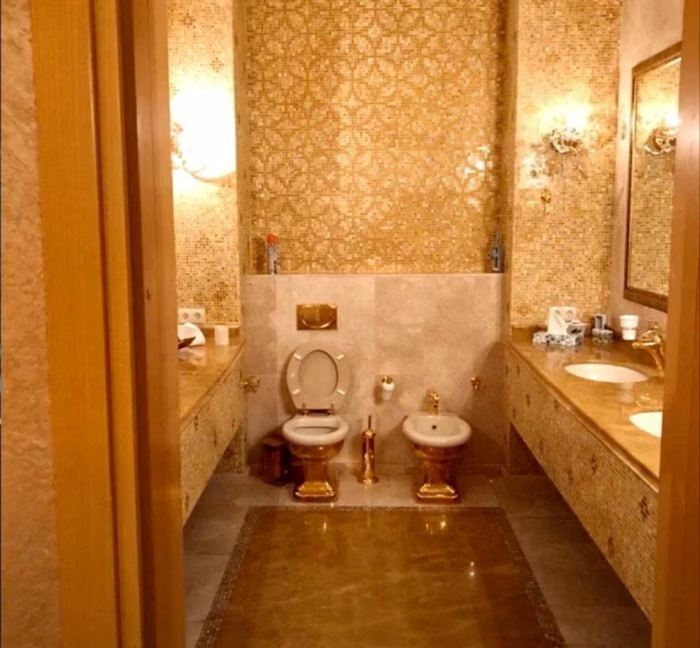 Timur Mindich, left, a friend and former business partner of Zelenskyy, centre, and former energy minister Svitlana Hrynchuk
Timur Mindich, left, a friend and former business partner of Zelenskyy, centre, and former energy minister Svitlana Hrynchuk
Photo: FT montage; AFP/Getty Images
Senior Ukrainians are accused of taking kickbacks from projects to defend energy plants in wartime, prompting a wave of public anger, ‘Financial Times’ stresses.
Law enforcement searches inside opulent Kyiv apartments, one with a golden toilet. Pictures of duffel bags filled with cash. Audio recordings of officials discussing money laundering strategies.
These are among the details that have shocked Ukrainians over the past week as Zelenskyy’s administration was engulfed in the biggest corruption scandal since he took office, destabilising Kyiv’s leadership at a critical moment in the war.
Zelenskyy and his closest aides had tried this summer to neuter independent anti-corruption agencies as they were finalising a sprawling probe targeting the president’s inner circle. But the Ukrainian leader and his allies were forced to abandon the attempt after mass protests and outrage from the country’s western partners.
Undeterred, investigators this week released a trove of detailed evidence, including damning claims that senior figures were taking kickbacks on construction projects to protect power stations from Russian missile attacks, at a time when Ukrainians are living with daily rolling blackouts.
Zelenskyy finally turned on the suspects in an attempt to protect his presidency. On Wednesday, he demanded the resignations of justice minister German Galushchenko and energy minister Svitlana Hrynchuk, both of whom were subsequently removed from the national security council.
He also imposed sanctions on Timur Mindich, a friend and former business partner charged in the case. Investigators said Mindich was the “co-organiser” of the alleged scheme, and that some $100mn of illicit funds passed through his office.
Despite the swerve in Zelenskyy’s approach, his response has been criticised as hesitant, while politicians are braced for further revelations that could further harm close allies of the man leading Ukraine through its brutal conflict with Russia.
Nabu said earlier this week it had carried out more than 70 searches and arrested five people in a “large-scale operation” with the Special Anti-Corruption Prosecutor’s Office (Sapo) to expose graft in the energy sector.
Investigators said officials and business figures had conspired to force suppliers to Energoatom, the country’s nuclear power company, to pay kickbacks worth 10 to 15 per cent of each contract’s value.
The outcome of the 15-month investigation, which Nabu said gathered more than 1,000 hours of wiretap evidence, sparked fury in Ukraine. Nabu said some kickbacks were taken from contractors hired to build structures to protect substations from Russian drone and missile attacks.
“Now Zelenskyy is keeping his distance [from] the people implicated in the case, and he is especially trying to avoid being associated with Mindich,” said Volodymyr Fesenko, a political scientist based in Kyiv.
Mindich, who co-owns the Kvartal 95 entertainment company of which Zelenskyy was a co-founder, was tipped off in advance and fled Ukraine hours before the investigation, according to Nabu chief detective Oleksandr Abakumov.
A Sapo prosecutor claimed during a Tuesday hearing of the high anti-corruption court that former defence minister Rustem Umerov, a trusted ally of Zelenskyy, could have been “influenced” by Mindich. Umerov has not been charged and denies any involvement.
“I think that right now, both society and the political class understand that a political crisis would be too dangerous,” said Fesenko, the political analyst.
“A lot depends on the next steps of the investigation, if new information comes out that involves Zelenskyy or the office of the president... then of course, it’ll be a new round.”
 A photo of a golden toilet said to be from one of the bathrooms in the apartment of Zelenskyy’s former business partner Timur Mindich.
A photo of a golden toilet said to be from one of the bathrooms in the apartment of Zelenskyy’s former business partner Timur Mindich.
Photo: FT via Telegram/social media
Ukraine’s Zelensky finds himself under fire over a burgeoning energy sector corruption scandal, while his people face a fourth tough winter, with power cuts and heating outages as severe as ever, CNN reports.
On the battlefield, Ukrainian forces find themselves losing ground across the east, most critically in the one-time logistics hub of Pokrovsk, as key Western allies appear to be focused elsewhere. The war may still be Ukraine’s overriding priority, but corruption is likely Zelensky’s most immediate concern.
The scandal, which centers on alleged kickbacks from contractors including those working to protect critical energy infrastructure, has already taken down two of Zelensky’s ministers and embroiled a former business associate from his days in the entertainment industry.
Investigators said about $100 million had been siphoned off – between 10-15% of the value of the contracts – as state-owned businesses including Energoatom, which operates Ukraine’s nuclear power plants, paid companies for work done to enhance security at key sites.
That the latest corruption scandal involves the energy sector gives it a particular edge. People in Kyiv are currently without electricity for eight to 11 hours per day, a result of Russia’s improved ability to strike power plants and substations.
Diesel generators, purchased during the first blackouts three years ago, have reappeared outside shops and cafes. Candlelit dinners have again become part of the daily routine.
The blackouts can also mean heating is off, lifts in high-rise buildings do not work, and water supply is interrupted. The situation is usually worse in towns and cities outside the capital.
Zelensky name-checked in court
Court hearings on the investigation – live streamed on the public broadcaster’s website – have been underway in Kyiv since Tuesday and look set to continue for at least the next few days. They include snippets of what investigators say are 1,000 hours of recorded conversations between the suspects in the case.
In a potentially damaging first, one of the conversations released Wednesday name-checked Zelensky himself. In a transcript read out in court, the man accused of masterminding the corruption scheme, Timur Mindich, appeared to suggest he had influence over the president, boasting to Galushchenko of his success in getting Zelensky to call the then-energy minister on the phone and invite him for a meeting.
The transcript contained no details of that alleged call, and Zelensky has made no comment. It is believed to be the first time his name has been mentioned, albeit indirectly, in a corruption case in Ukraine.
And then there is Mindich himself, perhaps the most awkward element in all this as far as Ukraine’s leader is concerned.
Given the codename Carlson by his alleged co-conspirators, Mindich is a former business partner of Zelensky, dating back to his previous career as a highly successful entertainer and producer.
Corruption allegations are nothing new in Ukraine. During the first months of Moscow’s full scale invasion, there was an unwritten understanding among Ukraine’s journalists and civil society that corruption investigations were not a priority. Defeating Russia was the only thing that mattered.
That consensus began to decay after about a year. Since 2023, the National Anti-Corruption Bureau of Ukraine (NABU) has opened investigations into a series of scandals, including an illegal land development project involving a deputy prime minister and the embezzlement of public funds allocated to pay for soldiers’ food.
So far, Zelensky has managed to avoid getting dragged into the scandals, though Ukrainians put him on notice in the summer with large anti-government protests – the biggest since the full scale invasion – after he approved a parliamentary move to neuter NABU and the Specialized Anti-Corruption Prosecutor’s Office. He backed down under pressure from key international allies, who have made anti-corruption an important plank of their long-term support for Kyiv.
read more in our Telegram-channel https://t.me/The_International_Affairs

 10:00 16.11.2025 •
10:00 16.11.2025 •






















